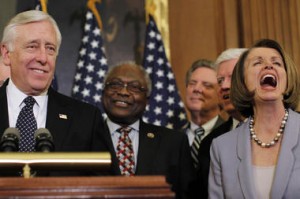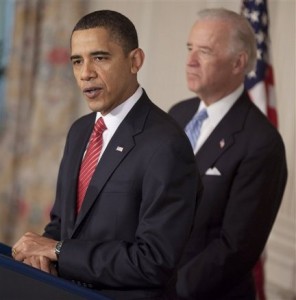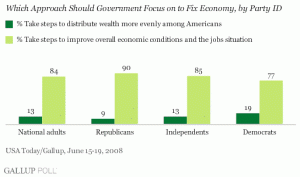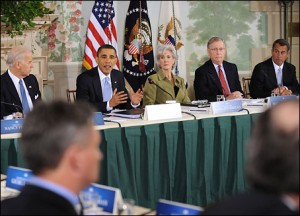
Has the Obama Brand Been Tarnished By the Ugly Partisan Process Surrounding the Passage of his Signature Initiative, Obamacare?
President Barack Obama and the Democrats deserve a night or two to celebrate their historic victory in ramming the Obamacare package through Congress against bipartisan opposition, although only Democrats voted for the bill last night (219) while both Democrats (34) and Republicans (all) opposed the bill. However, as the reality of passage sets in upon America, an analysis of the political effects upon the Obama Brand is an interesting subject to review. CentristNet takes on this subject as the establishment media is in full celebration mode, with absolutely no focus so far in any reporting about the meaning of the substantial Democratic defections in the House yesterday or the lack of a single Republican vote in Congress for the massive initiative that defines the Obama Administration.
President Barack Obama will sign the Senate bill, as passed by the House last night, into law sometime this week, making the Louisiana Purchase, Cornhusker Kickback and unfair exclusion of only Florida residents from the cuts to Medicare Advantage the law of the land while also sanctioning a very flawed process that led a bipartisan coalition of legislators to oppose the Democrats-only bill.
President Obama ran for election in 2008 as a bipartisan, pragmatic problem solver and has frequently claimed in 2009 and 2010 that he is running his Presidency in an open, transparent and bipartisan manner while fighting the “special interests” on behalf of the American people. Now, centrist and independent Americans, as well as ideologues on both sides, are confronted with the example of the signature initiative of the Obama Presidency – health care reform – being passed in the most partisan fashion possible, with absolutely no Republican support and substantial Democratic opposition. Indeed, 34 of the 253 voting House Democrats voted against the young President’s signature initiative – a not insignificant 13.4% of the House Democratic Caucus.
Considering this, one must now ponder the effect of this entire year-long process upon the Obama Brand – a brand that was built upon the idea of a post-partisan, cooperative governance that would end the untoward “ways of Washington” that so many Americans roundly reject. For instance, consider these sentiments from then-candidate Obama in his speech announcing his candidacy in January 2007:
We all made this journey for a reason. It’s humbling, but in my heart I know you didn’t come here just for me, you came here because you believe in what this country can be. In the face of war, you believe there can be peace. In the face of despair, you believe there can be hope. In the face of a politics that’s shut you out, that’s told you to settle, that’s divided us for too long, you believe we can be one people, reaching for what’s possible, building that more perfect union.
…
It was here we learned to disagree without being disagreeable — that it’s possible to compromise so long as you know those principles that can never be compromised; and that so long as we’re willing to listen to each other, we can assume the best in people instead of the worst.
…
I recognize there is a certain presumptuousness — a certain audacity — to this announcement. I know I haven’t spent a lot of time learning the ways of Washington. But I’ve been there long enough to know that the ways of Washington must change.
…
What’s stopped us from meeting these challenges is not the absence of sound policies and sensible plans. What’s stopped us is the failure of leadership, the smallness of our politics — the ease with which we’re distracted by the petty and trivial, our chronic avoidance of tough decisions, our preference for scoring cheap political points instead of rolling up our sleeves and building a working consensus to tackle big problems.
…
And as people have looked away in disillusionment and frustration, we know what’s filled the void. The cynics, and the lobbyists, and the special interests who’ve turned our government into a game only they can afford to play. They write the checks and you get stuck with the bills, they get the access while you get to write a letter, they think they own this government, but we’re here today to take it back. The time for that politics is over. It’s time to turn the page.
It is quite jarring to read the words of candidate Obama listed above considering that President Obama just forced his massive health care plan, which fundamentally remakes nearly 20% of the American economy, through Congress without a single Republican vote – hardly an example of “building a working consensus” as he promised America on that chilly day in January 2007. As jarring is the derisive 2007 talk about “special interests who’ve turned our government into a game only they can afford to play” as the President cut backroom deals with essentially every special interest group in the health care industry during the Obamacare process. As the Obama Administration has spent an overwhelming majority of its political capital to date on health care reform, the fact that the only bipartisan aspect of the Obamacare package in the final analysis is the bipartisan opposition to its passage is certainly not what the country expected when Obama was ushered into office with 53% of the vote in November 2008.

A Laughing House Speaker Nancy Pelosi is Seen Here after the House's 219-212 Passage of Obamacare Via Solely Democratic Votes With 34 Democrats and All Republicans joining in Bipartisan Opposition
Most Americans, including many centrists and independents, believed that Obama would work with Republicans on major issues like health care reform to produce centrist, bipartisan solutions. This early public confidence in Obama’s potential to be a post-partisan, centrist leader is shown by the incredible levels of approval Obama received early in his Presidency – upwards of 65-70% support. Obama’s approval had fallen steadily since March 2009 into a range between 45-50% before the passage of Obamacare today, no doubt in part due to the ugly, partisan acrimony surrounding the health care reform effort. Now that his signature initiative has passed, incredibly, without a single Republican vote in either the House or the Senate and 13.4% of House Democrats voting against it, America now knows that Obama has chosen a partisan path on the historic legislation that defines his Presidency. Historically speaking, this exclusively partisan passage of a major domestic reform is unprecedented in American history, as both parties voted in favor of Social Security and Medicare, as well as the Civil Rights Act – yet only Democrats voted for Obamacare.
Obama, of course, has chosen to push a different narrative immediately after the House passage of the Senate bill – one that focuses on the allegedly centrist nature of his bill that just passed without a single Republican vote and garnered 34 Democratic no votes. Obama gave a speech right after the House vote claiming that Obamacare proves “change in this country comes not from the top down, but from the bottom up” and that “tonight’s vote is not a victory for any one party — it’s a victory for them. It’s a victory for the American people. And it’s a victory for common sense.” Obama here is clearly trying to take the focus off the fact that only Democrats voted for his bill, and he reinforces his point by stating that now America will have “a health care system that incorporates ideas from both parties.” Oddly, Obama appears to see himself as apart from the American people, saying it is “a victory for them” as opposed to a victory for us. Obama also tweeted out this:
Tonight’s vote is not a victory for any one party – it is a victory for the American people. Tonight, we answered the call of history.
Obama also sent out an email to the many millions on his “Organizing for America” list, which said in part:
Our journey began three years ago, driven by a shared belief that fundamental change is indeed still possible. We have worked hard together every day since to deliver on that belief.
We have shared moments of tremendous hope, and we’ve faced setbacks and doubt. We have all been forced to ask if our politics had simply become too polarized and too short-sighted to meet the pressing challenges of our time. This struggle became a test of whether the American people could still rally together when the cause was right — and actually create the change we believe in.
Tonight, thanks to your mighty efforts, the answer is indisputable: Yes we can.
In last night’s speech, tweets, and email, Obama is trying to take the focus off the fact that only Democrats voted for the signature initiative of this Presidency and avoid the subject of bipartisanship if possible, despite the fact that the Obama Brand is based in part on the image of Obama as a pragmatic bipartisan reformer. Both his speech and tweet make the claim that last night’s historic passage of Obamacare is “not a victory for any one party”, while the email to his campaign list removes this reference for obvious reasons. All three communications claim that the passage of the bill is a victory for the “American people” despite the fact that a majority of the American people oppose the bill in general and 64–73% of Americans would have preferred the President and Democrats either start over or start from scratch than do as they have now done in passing the present enormous, partisan bill. All told, it is clear that Obama will try to avoid any discussion of the lack of any semblance of bipartisanship in his signature initiative while also asserting that Obamacare “runs straight down the center of American political thought“, and it remains to be seen if that dog will hunt.
The odious special interest deals and pork in the Senate bill that was passed on Christmas Eve by the Senate, and last night by the House, will now all become the law of the land upon Obama’s planned signature early this week. While Obama and the Democrats will attempt to ram through a new bill to make changes to Obamacare though the Senate, the hard reality of the situation is that President Obama will sanction and endorse each and every backroom deal and pork handout in the Senate bill when he affixes his signature to it. The Senate may never pass the “fixes” Obama wants to the bill, “fixes” that were made necessary by the untoward deal cutting to obtain the Christmas Eve Senate passage of Obamacare from the sixty Democratic Senators who voted for it, such as the Cornhusker Kickback, Louisiana Purchase and ridiculous provisions that allow Florida residents to retain Medicare Advantage benefits while all other states’ residents lose same.

The Backroom, Pork-Laden Deals Between President Barack Obama and Nearly Every Special Interest Group in the Health Care Industry Have Dented the Obama Brand
Additionally, the President referred to his fighting the “special interests” in his comments last night, as well as in his 2007 campaign kickoff speech and at many points in between, and the image of Obama as a tireless fighter of “special interests” in Washington is a critical component of the Obama Brand. Here as well, the Obama Brand has taken a hit during the Obamacare process as Obama himself has made backroom deals with the large drug companies (“Big Pharma”), American Medical Association, the hospitals, the AARP, the unions, and even some insurance companies as the past year of as the process has unfolded.
Regardless, in the days to come, expect Obama and the Democrats to attack the Republicans for “delaying” the “fixes” to the bill the Democrats themselves assembled and passed through the Senate on Christmas Eve. For instance, Obama also had this to say last night:
“On Tuesday, the Senate will take up revisions to this legislation that the House has embraced and these are revisions that have strengthened this law and removed provisions that have no place it in. Some have predicted another siege of parliamentary maneuvering in order to delay adoption of these improvements. I hope that’s not the case. It’s time to bring this debate to a close and bring in the hard work of implementing this reform properly on behalf of the American people.”

President Barack Obama, here with VP Joe Biden, on December 24, 2009 Praising the Senate Obamacare Bill's Passage
Here Obama is already staking out the high ground in the next phase of the Obamacare legislative battle, asserting that the changes that are to pass via reconciliation will remove “provisions that have no place” in the legislation. However, Obama himself is set to sign that very legislation early this week, and Obama had nothing at all to say about “provisions that have no place” in the bill in his December 24, 2009 statement after the Senate passage of Obamacare, calling it a “tremendous step forward” as he “hailed Senate passage“.
It appears that Obama and the Democrats will attempt to demagogue the GOP for stalling the Democratic attempt to push through changes to Obamacare via reconciliation in Senate by claiming the GOP is stopping the Democrats from fixing the very fraudulent deals the Democrats themselves made in order to obtain the initial Senate passage of the bill. As with Obama’s attempt to frame Obamacare as a bipartisan piece of legislation despite the fact that only Democrats voted for it and 13.4% of the House Democratic Caucus joined a unified GOP in opposing it, it remains to be seen if this dog will hunt as well.
Indeed, the entire, high profile “sausage-making” process over the past year or so surrounding the passage of the President’s signature initiative, Obamacare, demonstrates all of the untoward “ways of Washington” that candidate Barack Obama condemned in 2007-8, and President Obama has condemned in 2009 and 2010. Indeed, last night Obama condemned the very bill he will sign this week as having “provisions that have no place” in it. Further, the background story of the strong arming done by Obama and Speaker Nancy Pelosi over the past few weeks of reluctant House Democrats is sure to be more fully reported in the days to come, and such details are also destructive of the Obama Brand.
All told, the Obama Brand of pragmatic bipartisanship has been seriously dented by the facts surrounding the passage of his Presidency’s signature initiative, and the next few weeks could bring more highlighting of the odious parts of the bill as the battle over Senate reconciliation heats up next week. Few, if any, Americans who voted for President Obama in November 2008 could have forseen that he would end up forcing comprehensive health care reform through Congress with only Democratic votes over bipartisan opposition via an ugly backroom deal laden process, and those facts could indeed change the way many Americans view the young President. Finally, then-candidate Obama’s words in 2007 about the need to avoid “slash and burn” politics and how American cannot “pass universal health care with a 50-plus-one strategy” are especially jarring considering the process that has now ended in the wholly partisan passage of his signature initiative:
Obama was talking about the differences between himself and his then-opponent in the Democratic primary, Hillary Clinton.
“I think it is legitimate at this point for me to explain very clearly to the American people why I think I will be a better president than Hillary Clinton, and to draw contrasts,” Obama said.
“But that’s very different from this sort of slash-and-burn politics that I think we’ve become accustomed to. Look, part of the reason I’m running is not just to be president, it’s to get things done. And what I believe that means is we’ve got to break out of what I call, sort of, the 50-plus-one pattern of presidential politics. Which is, you have nasty primaries where everybody’s disheartened. Then you divide the country 45 percent on one side, 45 percent on the other, 10 percent in the middle — all of them apparently live in Florida and Ohio — and battle it out. And maybe you eke out a victory of 50-plus-one, but you can’t govern. I mean, you get Air Force One, there are a lot of nice perks to being president, but you can’t deliver on health care. We’re not going to pass universal health care with a 50-plus-one strategy. We’re not going to have a serious bold energy policy of the sort I proposed yesterday unless you build a working majority. And part of the task of building that working majority is to get people to believe in our government, that it can work, that it’s based on common sense, that it’s not just sort of scoring political points.
The interviewer then asked, “So is your answer to ‘Why I will be a better president than Hillary Clinton,’ is your answer that she’ll be a 50-plus-one president and you won’t?”
“Yes,” Obama said.
Technorati Tags: Barack Obama, Bipartisan Coalition, Bipartisan Manner, bipartisan opposition, Candidacy, Coalition Of Legislators, Cooperative Governance, Democratic Opposition, Democrats, destructive, Establishment Media, Face Of Despair, Florida Medicare, Florida Residents, Health Care Reform, House Democratic Caucus, House Democrats, Independent Americans, Interest Deals, Kickback, Louisiana Purchase, Massive Initiative, Medicare, obama brand, obamacare, One People, Passage Sets, Perfect Union, Presidency, Problem Solver, Republican Support, Republican Vote, Republicans, Senate Bill, Sentiments, Signature Initiative, Special Interests, tarnished, victory







